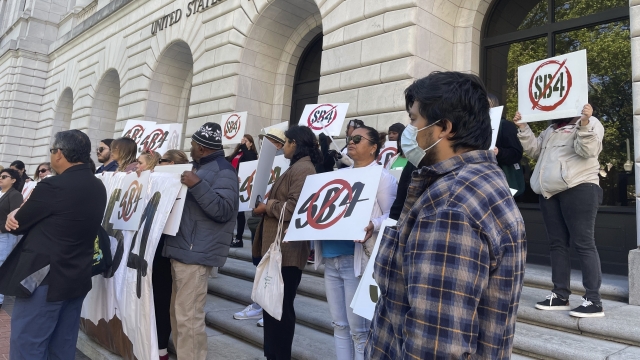The legal battle over Texas's controversial immigration law expanding the powers of local law enforcement over migrants was back in court Wednesday.
The U.S. 5th Circuit Court of Appeals heard oral arguments to consider whether the law Gov. Greg Abbott supported and signed is unconstitutional.
It gives any licensed police officer in the Lone Star State the power to arrest and detain people they suspect of entering the country illegally. It's been at the center of a legal back-and-forth over its constitutionality.
During arguments, the attorney arguing for Texas admitted to the appellate court that perhaps Texas went to too far in crafting its far reaching law, but insisted the state is within its rights to establish its own border security mechanism
The law known as SB4 has been blocked from taking effect while its constitutionality is argued in court.
Texas Solicitor General Aaron Nielson insisted the law does not interfere with federal authority on immigration. He also referred to a 2012 U.S. Supreme Court decision that struck down an Arizona law which had similar provisions.
In that case out of Arizona, the Supreme Court ruled immigration enforcement was largely under the purview of the federal government, although part of the law requiring police officers to inquire about a person's immigration status was allowed to stand.
Nielson inferred Texas lawmakers wrote the law using Arizona as a model.
"What Texas has done here is that they've looked at the Supreme Court's precedent and they have tried to develop a statute that goes up to the line of Supreme Court precedent but allows Texas to protect the border," Nielson said in court. "Now to be fair, maybe Texas went too far and that's the question the court's going to have to decide."
A Texas state representative who opposed SB4 took note of Nielson's concession.
"He admits Texas may have gone too far, " said Rep. Armando Walle, a Houston area Democrat.
In October before the state legislature passed the bill, his outburst caught on cell phone camera toward his Republican colleagues went viral on social media. He told the largely White caucus that their support of it discounted the effects it could have on Hispanics — whether they're citizens or not.
Texas Republicans who favor the law have said it's necessary due to the record number of unauthorized crossings into the country since President Joe Biden assumed the White House. They argue that if the federal government won't do its job, Texas has a right to step in.
SEE MORE: Sheriffs worry about housing detained migrants at US-Mexico border
Walle says Texas can play a role cooperate with the federal government instead of fighting it. He said SB4 will lead to racial profiling.
"Texas itself has a long-complicated history in its treatment of people of color," Walle said.
Walle believes Hispanics in Texas have historically been asked to "always prove their citizenship."
"I come from a multi-generational Texan family," Walle said, adding it dated back to before the Civil War.
A large portion of Houston's Latinos are Mexican nationals both documented and undocumented. Overall 2022 data from U.S. Census Department said more than 45% of Houston's 2.3 million people are Hispanic.
The law allows local judges — regardless of knowledge or training on immigration matters — to order a migrant to return to Mexico, regardless of nationality. The government of Mexico opposes the law and has said it will not accept foreign nationals deported to that country, according to a friend of the court brief it filed on this case.
Mexico's government also said that the law could sour the current relationship between the U.S. and Mexico.
"The bill certainly generates uncertainty in the population. We have received questions about what implications it has, how will the community's relationships with the authorities change," said Juan Carlos Hernandez Wocker, Consul for Protection at the Mexican Consulate.
Officials at the Mexican consulate in Houston say they're busy reassuring that community. In an interview conducted in Spanish, Hernandez said local police assured his office they won't be immigration police.
"We know their focus is not on criminalizing migrants," Hernandez said," But rather on preventing crime and public safety."
In some of the larger cities, more progressive politically, law enforcement and local officials have sought to soothe anxieties.
The law can't be enforced right now. That's because the same three-judge panel of judges already decided, in a 2-to-1 decision, that SB4 should stay blocked while the case plays out.
That decision on March 27 came after a flurry of legal back-and-forth that saw the law paused, briefly put in place and then blocked again.
In more rural conservative portions of the Lone Star state, the politics change to deep support and a belief Texas can and should police its roughly 1,200-mile border with Mexico. The appellate court didn't decide on the law Wednesday but will likely release a ruling in the coming weeks. Whatever it decides the case may ultimately go to the U.S. Supreme Court.
Trending stories at Scrippsnews.com




